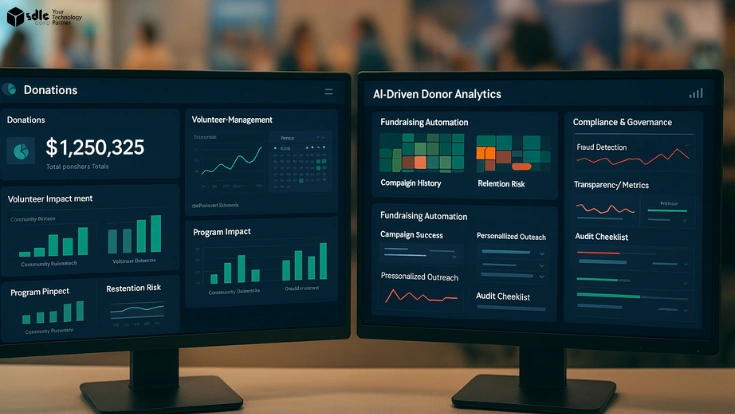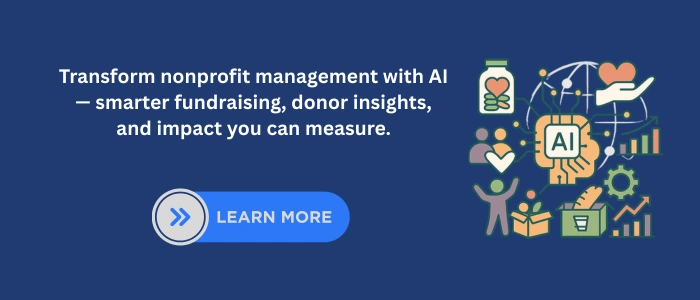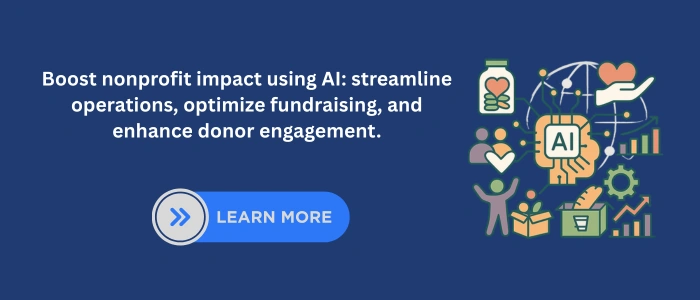Introduction
AI for nonprofit organizations is no longer a distant concept. Today, many charities, foundations, and mission-driven groups use artificial intelligence to increase impact, reduce waste, and improve decision-making. Unlike commercial enterprises, nonprofits face unique challenges. Limited budgets, reliance on donors, and the need for accountability mean that every resource must be used with care. As a result, artificial intelligence provides tools to meet these challenges with accuracy and efficiency.
When used thoughtfully, AI helps nonprofits forecast fundraising outcomes, analyze donor behavior, and improve operational planning. In addition, it enables them to manage volunteers, track project progress, and identify where resources can be applied for the greatest social benefit. This article explains how nonprofit AI solutions are shaping the sector, how AI in nonprofit management enhances transparency and efficiency, and why technologies like AI for nonprofit fundraising, AI donor analytics for nonprofits, and machine learning in nonprofit operations are becoming essential.
For more insights, explore our AI Development Services designed to help nonprofits achieve measurable impact
Why AI Matters for Nonprofits

Nonprofits exist to create positive impact, often in areas where resources are limited. Administrative inefficiencies or poor planning can weaken the ability to deliver services. However, AI offers data-driven support that minimizes guesswork and improves outcomes.
Key reasons AI matters for nonprofits:
- Resource Allocation: AI can analyze where donations and grants are most needed and distribute them effectively.
- Operational Efficiency: Routine tasks like report generation, volunteer scheduling, and donor follow-ups can be automated.
- Decision-Making: AI platforms provide data-backed insights for board members and executives.
- Transparency: With accurate data tracking, nonprofits demonstrate accountability to donors and regulators.
Therefore, when integrated responsibly, AI systems help nonprofits focus more on their mission and less on administrative burdens.
Nonprofit AI Solutions in Action

Nonprofit AI solutions cover a wide range of applications. These tools are designed to solve real problems nonprofits face daily. Moreover, they allow organizations to improve both efficiency and transparency. Examples include:
- Fundraising Automation
AI-powered tools draft personalized donor outreach messages, track past interactions, and schedule the best times to connect. - Donor Retention
Predictive models identify donors who may stop giving. Consequently, nonprofits can reach out early with tailored engagement. - Impact Measurement
AI systems track program effectiveness with real-time data, helping organizations adjust strategies quickly. - Fraud Detection
By analyzing transaction data, AI detects irregular donation activity, protecting the integrity of nonprofit finances. - Language and Accessibility
AI-driven translation and transcription tools make nonprofit programs accessible to diverse communities.
These nonprofit AI solutions ensure that organizations manage complexity while staying focused on their goals.
You may also find our article on AI Tools for Digital Transformation useful for understanding technology adoption strategies.
Enhancing Strategy with AI in Nonprofit Management

Strong management is essential for nonprofits. Leaders must make decisions that balance limited funds with broad missions. AI in nonprofit management helps leadership teams by offering clarity and foresight. Furthermore, it improves planning and accountability across different functions.
Examples of applications:
- Budget Planning: AI analyzes past spending and predicts future needs, helping organizations build realistic budgets.
- Project Tracking: Dashboards powered by AI monitor progress and highlight risks in ongoing programs.
- Volunteer Coordination: Machine learning helps schedule volunteers where they are most effective, reducing overlap or shortages.
- Regulatory Compliance: AI tools flag compliance risks and help ensure that reporting standards are met.
By integrating AI in nonprofit management, organizations reduce waste, improve accountability, and align operations with their core missions.
Learn how Generative AI for Nonprofit Organizations improve accountability and resource use.
Fundraising and Donor Engagement

Fundraising remains central to nonprofit sustainability. AI for nonprofit fundraising changes how organizations identify, attract, and retain donors. In fact, it allows fundraising teams to move from broad campaigns to personalized engagement.
- Predictive Models for Giving
AI forecasts which donors are most likely to contribute during specific campaigns. As a result, nonprofits can focus efforts where they matter most. - Optimized Campaigns
Machine learning reviews past campaigns, highlighting what worked and what did not. Thus, campaign strategies improve with each iteration. - Personalized Donor Experience
AI-driven systems adjust communication styles, preferred channels, and messaging based on donor profiles. - Major Gift Identification
AI analyzes donor wealth indicators and philanthropic history to highlight individuals capable of making significant contributions.
With AI for nonprofit fundraising, organizations shift from generic appeals to data-driven engagement strategies that deliver stronger results.
Explore more about Manufacturing Analytics Services that strengthen donor retention and engagement strategies.
Using AI Donor Analytics for Nonprofits

Donor data is valuable. Understanding who gives, why they give, and how to maintain relationships is central to fundraising success. AI donor analytics for nonprofits provides insights that manual review often misses.
Practical applications include:
- Segmentation: Donors can be grouped by interests, demographics, or giving patterns.
- Retention Analysis: AI identifies when donors are likely to lapse, enabling proactive engagement.
- Impact Reports: Donors increasingly want to see results. Therefore, AI generates personalized reports showing the direct effect of their contributions.
- Cross-Channel Tracking: AI systems consolidate donor activity across email, events, and social media, building a full picture of engagement.
With AI donor analytics for nonprofits, organizations maintain stronger relationships and secure long-term support.
Machine Learning in Nonprofit Operations

Behind every nonprofit is a complex set of operations. From staffing to logistics, managing these efficiently is crucial. Machine learning in nonprofit operations helps organizations automate repetitive tasks and optimize resource use. In addition, it creates opportunities to save costs and increase reach.
Examples include:
- Inventory Management: Humanitarian nonprofits can use machine learning to predict supply needs and avoid shortages.
- Scheduling: ML-based tools automatically create efficient schedules for staff and volunteers.
- Service Delivery: Predictive models identify where services are most needed, ensuring resources reach the right people.
- Risk Reduction: Machine learning identifies potential operational bottlenecks and suggests preventive measures.
By applying machine learning in nonprofit operations, organizations reduce costs, save time, and increase their reach.
Related reading: AI in Logistics highlights how machine learning optimizes resources in complex operations.
Ethical Considerations and Risks

While AI brings many benefits, nonprofits must also address ethical concerns. For example, issues like bias, privacy, and over-reliance on automation require attention.
- Bias in Data: If training data is biased, AI systems may reinforce inequalities.
- Privacy Concerns: Donor and beneficiary data must be handled responsibly.
- Over-Reliance on Automation: While automation saves time, human oversight remains essential.
- Accessibility Gaps: Smaller nonprofits may lack the resources to adopt AI effectively.
Therefore, responsible use of AI requires transparency, ethical governance, and clear communication with stakeholders.
The Future of AI in Nonprofits

The future of AI for nonprofit organizations looks promising. Moreover, as technology becomes more affordable, smaller nonprofits will gain access to advanced tools. Advances in natural language processing, predictive modeling, and automation will continue to reshape fundraising, donor management, and operational efficiency.
The coming years will also see nonprofits using AI for cross-sector collaboration. For instance, shared platforms may allow organizations to pool donor data (while protecting privacy), coordinate responses to crises, and maximize global impact.
Consequently, the path forward will involve balancing innovation with responsibility. Those who adopt AI strategically will strengthen their missions and deliver greater impact.
Conclusion
AI provides nonprofits with opportunities to make smarter decisions, engage donors more effectively, and optimize operations. By leveraging nonprofit AI solutions, organizations achieve better results with fewer resources. Tools such as AI for nonprofit fundraising, AI donor analytics for nonprofits, and machine learning in nonprofit operations are not just innovations but essential steps toward stronger impact and sustainability.
The integration of AI in nonprofit management ensures accountability, efficiency, and resilience in an increasingly complex environment.
Contact us SDLC corp to explore how AI can transform your nonprofit. Hire AI Development Services with SDLC Corp to build solutions that align with your mission and maximize your impact.
FAQs
How Can AI For Nonprofit Organizations Improve Impact?
AI for nonprofit organizations improves impact by optimizing resource allocation, reducing costs, and increasing donor engagement.
What Are The Benefits Of Nonprofit AI Solutions?
Nonprofit AI solutions help automate operations, track program effectiveness, and strengthen transparency for donors and stakeholders.
How Does AI In Nonprofit Management Support Decision-Making?
AI in nonprofit management provides predictive insights, simplifies budget planning, and ensures regulatory compliance across projects.
Why Is AI Donor Analytics For Nonprofits Important?
AI donor analytics for nonprofits identifies giving patterns, predicts donor churn, and creates personalized engagement strategies for retention.
How Does Machine Learning In Nonprofit Operations Increase Efficiency?
Machine learning in nonprofit operations automates repetitive tasks, forecasts supply needs, and improves service delivery accuracy.

















